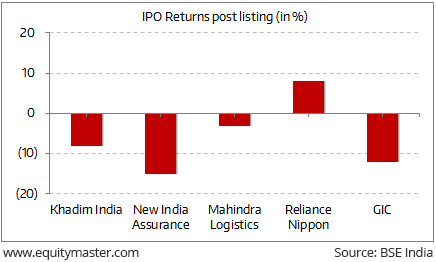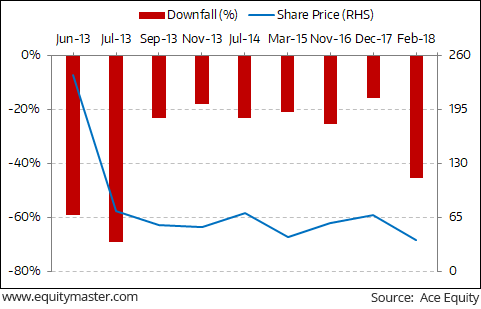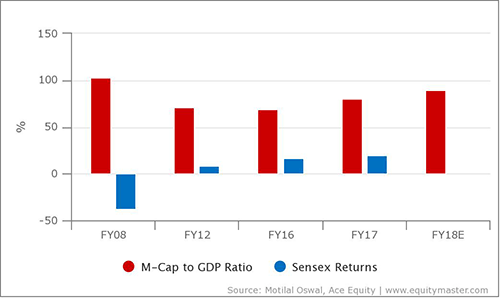After opening the day in red, share markets in India have continued the downtrend and are presently trading below the dotted line. Sectoral indices are trading mixed with stocks in the metals sector and stocks in the realty sector trading in red. While stocks in the IT sector are trading in green.
The BSE Sensex is down by 450 points (down 1.4%) and the NSE Nifty is trading down by 143 points (down 1.4%). Meanwhile, the BSE Mid Cap index is trading down by 1.8%, while the BSE Small Cap index is trading down by 2%. The rupee is trading at 65.13 to the US$.
In news from stocks in the IPO space. Bharat Dynamics’ IPO made a dull debut and got listed at Rs 370, a discount of over 15% to the issue price of Rs 428.
The Rs 9.6-billion initial public offering (IPO) of state-run Bharat Dynamics barely sailed through in the subscription phase, with the retail portion subscribed just 1.3 times.
Headquartered in Hyderabad, Bharat Dynamics is the sole manufacturer of Surface to Air Missiles (SAM), Torpedoes and Anti-Tank Guided Missiles (ATGM) in India. It is a public sector undertaking under the Ministry of Defence.
The company has grown its revenues and profits at a compounded annual growth rate of 130% and 5% respectively in the preceding three years. At the upper price band of Rs 428, the company is valued at 16 times it’s FY17 earnings.
It had set a price band of Rs 413 and Rs 428 and planned to raise up to Rs 9.8 billion.
We had analysed the IPO and released a recommendation note for the Bharat Dynamics IPO, you can access it here.
At the time of writing, Bharat Dynamics share price was trading up by 18% from its issue price.
IPO Subscription Times (2017)

One space which tests the investor’s contrarian philosophy is the IPO space. The demand for IPO’s has reached sky-high levels. Avenue Supermarts was the first company this year to cross the 100-time subscription mark swiftly followed by CDSL and Dixon technologies lately, with MAS Financial Services being the newest entrant to the list.
The market euphoria is something similar to what was seen in 2007–08. When everyone around you is clamoring to get a piece of the IPO pie, it makes sitting tight difficult. And, why should you sit tight when stocks like Avenue Supermart lets you pocket a cool 100% gain from day 1 of the listing?
History suggests that these cases are few and far between. More than 70% of the IPOs listed in 2007 and 2008 are in the red, even today when the Sensex is at an all-time high.
This allows us to stay on the fence when it comes to investing in IPOs. But it doesn’t make sense to completely ignore this space. For every Reliance Power — like issue, there have been issues like Maruti, TCS, and Jubilant Foodworks Ltd (with returns over 4,000%, 1,000% and 500% respectively) that have created immense wealth for shareholders.
A merit-based selection primarily including valuation, business, and management quality is the logical way to go about it. If it means going against the herd, so be it. And going by recent past, this strategy has been proven to be successful more often than not.
Moving on to news from stocks in the IT space. Infosys share price is in focus today after the IT services major disclosed additional investments.
The IT major said that it has made an additional investment of US$ 1.5 million in Waterline Data Science, a data discovery and data governance software provider firm, through the Infosys Innovation Fund.
Infosys had in 2016, picked up a stake worth US$ 4 million in the US based Waterline Data Science.
With this investment, Infosys has a minority holding not exceeding 20% of the outstanding share capital of the company, said the company in a filing to the stock exchange.
Originally incorporated in December 2013, Waterline provides data scientists and business analysts with a self-service data catalogue to help discover, understand and provision data. It also gives an automated data inventory that enables agile data governance across metadata, data quality and data lineage.
Notably, the investment was made through the Infosys Investment Fund, which is a US$ 500 million worth of fund for investments in startups that work on big data & analytics, machine intelligence and other disruptive technologies. It has so far invested in 11 such firms.
At the time of writing, Infosys share price was trading up by 0.8%.
This article was originally published in English at www.equitymaster.com
Read the complete Indian stock market update. For the terms of use, go here.




